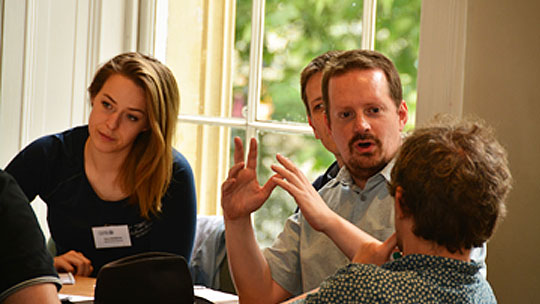The mathematics of loneliness, social benefit, and biology at SAMBa Integrative Think Tank #8
From the 11-15 June, SAMBa welcomed over 80 participants to Bath for the 8th Integrative Think Tank (ITT). Participants included:
- ITT8 partners from the Office of National Statistics Data Science Campus, the Bath Department of Biology & Biochemistry, and Paraguayan visitors from the Centro para el Desarrollo de la Investigacin Cientca (CEDIC), and the Ministry of Planning for Social and Economic Development
- academics and students from across the university from SAMBa, Mathematical Sciences, Biology & Biochemistry, Physics, Computer Science and Psychology
- external visitors from previous ITT partners (BT, Roche, GKN), as well as representatives from organisations as diverse as the Urban Big Data Centre (University of Glasgow), the Government Office for Civil Society, and the Cabinet Office.
ITT’s are intensive, week-long events, pioneered by the SAMBa Centre for Doctoral Training, which formulate mathematical problems in collaboration with external partners, leading to both short and long-term collaborative projects. The aim is to take large scale, applied challenges and reformulate them into mathematical questions that could be addressed through future research activity.
Mathematics is everywhere
We worked with our partners in the months leading up to ITT8 to scope a variety of statistical applied mathematics-driven problems including MRSA transmission trees, self-healing concrete, experimental evolution, and plant pathogens for Biology and Biochemistry; and loneliness, and physical activity for ONS. In addition, we worked on problems involving insect vector-borne diseases, and determining recipients of social benefits with the Centro para el Desarrollo de la Investigacin Cientca (CEDIC), and the Ministry of Planning for Social and Economic Development.
After the initial presentation of their problems, our partners worked with students and academics to investigate novel ways forward and to co-create potential research projects. José Molinas, Paraguayan Minister for Planning was so impressed with the SAMBa students he worked with that he has invited them to Asunción to train government staff in the approach they developed over the week of ITT8. As well, we celebrated Marcus Kaiser being the first SAMBa student to pass his PhD viva.
A unique experience
ITT’s are part of the training experience for SAMBa students and form an integral part of the first year. Students are encouraged to cross traditional boundaries and take a multi-disciplinary approach to problem-solving. In collaboration with the industrial partners, students work on real-world problems in teams and present their findings at the end of the week.
First year SAMBa student Eleanor Barry (Cohort 4) reports: "The ITT was successfully implemented again, and it was lovely to see great results achieved in such a short space of time. I always find the ITT to be beneficial to students who get to use their knowledge on real problems (and get to see what real-life data can look like!) and the partners who get new insights into their challenges.
Having worked on implementing a better allocation of benefits in Paraguay, I am really excited to be heading out there at the end of July with other students and academic staff, to discuss our findings with the Minister of Planning. I hope this will be an opportunity for learning on both sides and one which will foster and strengthen future collaboration."
Dr Jasmine Grimsley of the Office of National Statistics said: “The ITT8 provided an amazing melting pot for problem solving complex ideas. The diverse mix of backgrounds working together and the amazing SAMBa students facilitated problem solving that was both dynamic and highly innovative. I am grateful to have been a part of such an exciting week!”
And Dr Nick Priest from the Department of Biology and Biochemistry tells us: "Participating in ITT8 was an exhilarating way to do science. I knew that recruiting applied mathematicians to our team would help solve a vexing non-linear problem for us, but I was surprised by the level of collaboration. Each member of the team had a moment when they made the critical contribution which helped keep progress moving. Now that ITT8 has ended, we have met to etch out the plan for next steps."
Coming up
The next ITT will take place in January 2019. If you’d like to find out more about the ITT model or participate in an ITT week, please contact the SAMBa Centre Manager, Dr Susie Douglas.
Read about: - ITT1 - ITT2 - ITT3 - ITT4 - ITT5 - ITT6 - ITT7

